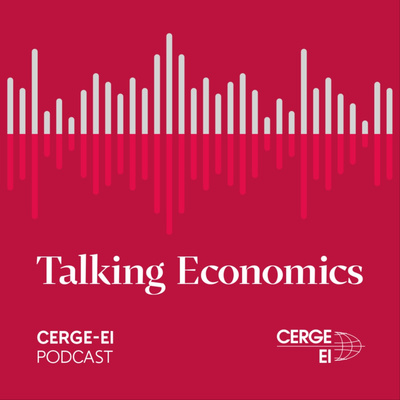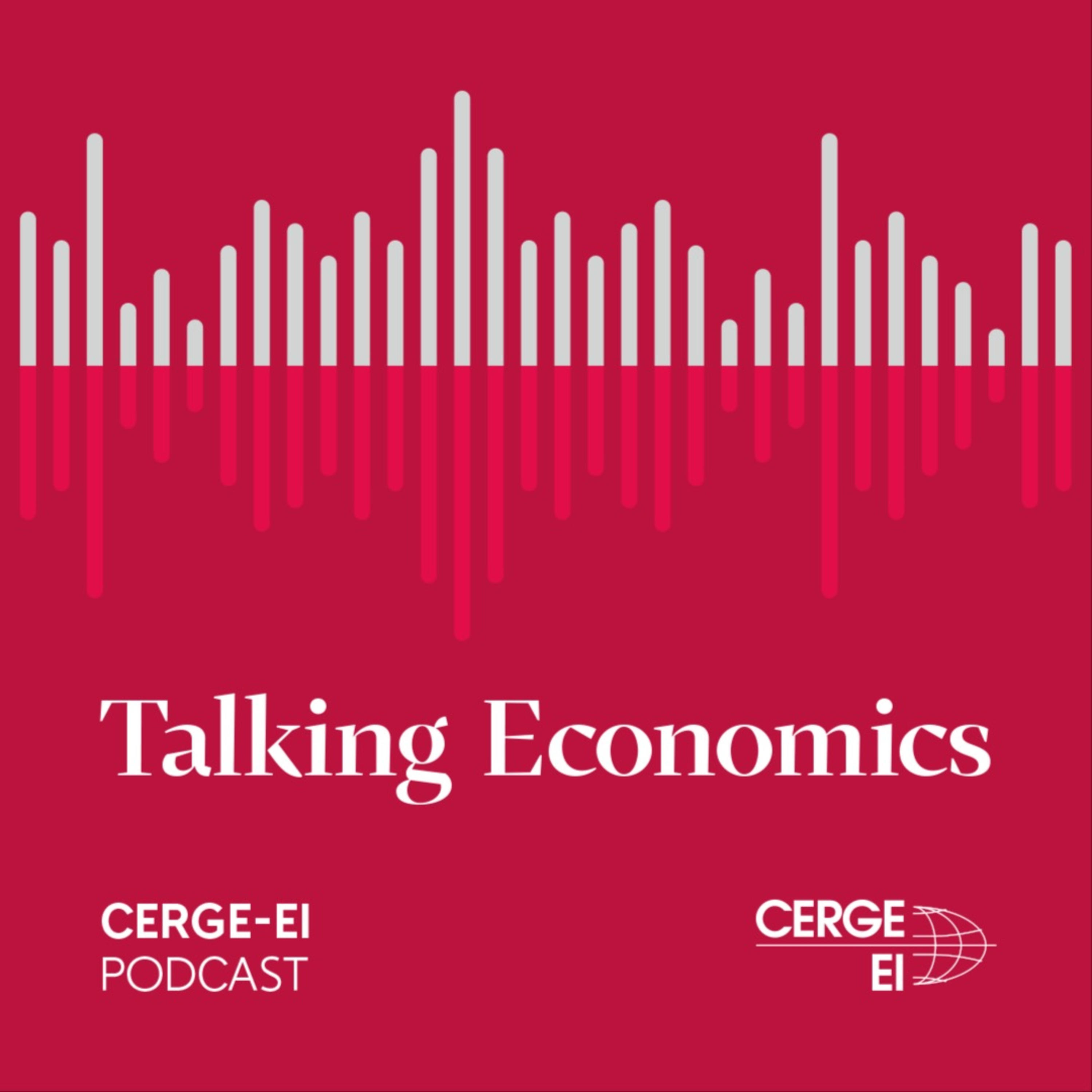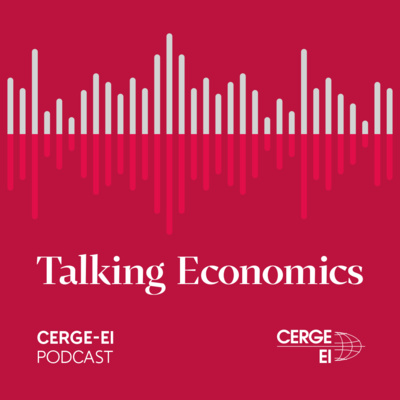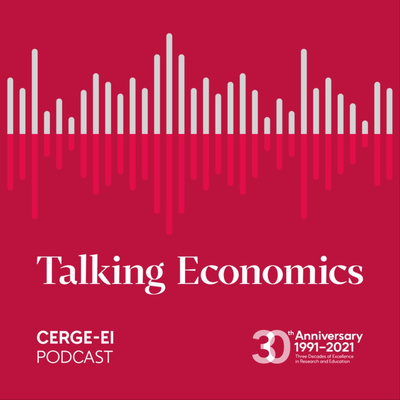
Talking Economics
By CERGE-EI
Center for Economic Research and Graduate Education - Economics Institute (CERGE-EI)
A podcast on actual economic research and its challenges and opportunities in the changing world.
A podcast on actual economic research and its challenges and opportunities in the changing world.
Where to listen

Štěpán Jurajda: Social Isolation is Costly
Can humans cooperate with one another when facing extremely low survival chances? Do pre-existing social ties increase one's chances of survival in life-and-death situations? Social linkages in extreme circumstances are discussed with Štěpán Jurajda in Talking Economics.
Štěpán Jurajda is the Mellon Endowment Professor with Tenure at CERGE-EI, a Full Professor at CERGE, Charles University, and a Senior Researcher at the Economics Institute of the Czech Academy of Sciences. He also serves as Deputy Minister for Science, Research and Innovation of the Czech Republic. His paper Social Networks and Surviving the Holocaust brings new evidence for historical research.
https://www.cerge-ei.cz
https://www.instagram.com/cergeei/?hl=en
https://www.facebook.com/cergeei
21:48
February 27, 2023

Sebastian Ottinger: Just a Few People Can Make a Difference
When and why do national institutions change? Can some people living under particular institutions, such as democracy, play a crucial role in changing their institutions back home? Do national leaders matter? Katarína Stehlíková and Sebastian Ottinger look back to European history, and from the perspective of political economy, discuss its relevance for institutional change in today’s China or Russia.
Sebastian Ottinger has been an Assistant Professor at CERGE-EI since September 2022. He is an Applied Microeconomist with research projects in the fields of Urban Economics and Political Economy, all drawing on European or American Economic History. He earned his Ph.D. from UCLA Anderson School of Management in 2021.
https://www.cerge-ei.cz
https://www.instagram.com/cergeei/?hl=en
https://www.facebook.com/cergeei
36:22
January 31, 2023

Gérard Roland: Empires, Nation States, and Democracies: Perspectives on the War in Ukraine
Empires, nation states, and democracies: Perspectives on the war in Ukraine is what our anchor, Katarína Stehlíková, has discussed with our special guest, prof. Gérard Roland, in the latest episode of Talking Economics.
Professor Gérard Roland is a member of CERGE-EI’s Executive and Supervisory Committee, an E. Morris Cox Professor of Economics, and Professor of Political Science at the University of California, Berkeley. His early work includes political economy of communism. He has been one of the world's most renowned and influential scholars in transition economics since 1990. His work also focuses on the impact of culture and political institutions on the prosperity of countries.
https://www.cerge-ei.cz
https://www.instagram.com/cergeei/?hl=en
https://www.facebook.com/cergeei
36:24
November 28, 2022

Klára Kalíšková: There Are Big Reserves in Increasing Labor Force
The Czech labor market situation has been affected by the COVID-19 pandemic and in recent months by the war in Ukraine. What are the main characteristics of the Czech labor market now? What changes has the labor market undergone in recent years? What is the position of women in the Czech labor market? In Talking Economics Katarína Stehlíková talks about these issues with Klára Kalíšková.
Klára Kalíšková is a CERGE-EI PhD alumna, an Assistant Professor at Faculty of Informatics and Statistics, Prague University of Economics and Business, researcher of IDEA think tank, and Associated Scientist at Economics Institute of Czech Academy of Sciences. Her main research interests lie in empirical and policy-oriented research in labor economics and applied econometrics.
24:19
September 19, 2022

Jaroslav Borovička: Think About the Long-Term Outlook
How are monetary and fiscal policy, the main macroeconomic tools used to steer our economies, able to address the unprecedented challenges presented by the events of recent years, such as COVID-19, war on Ukraine, or increase in energy prices? In Talking Economics, Katarína Stehlíková and Jaroslav Borovička give us a macroeconomic look at the current economy.
Jaroslav Borovička is a CERGE-EI MA in Economics alumnus and one of the leading Czech macro economists. He holds a Ph.D. degree from the University of Chicago and works as an Associate Professor at the Department of Economics at New York University in the United States.
36:48
August 19, 2022

Silvester van Koten: We Need to Address the Shortage of Oil and Gas
Russia’s invasion of Ukraine has boosted the already high prices of oil and gas. How come the energy situation in the EU is so dependent on Russia? What are the prognoses for energy costs and related costs of living for the near future? Katarína Stehlíková talks about War on Ukraine’s effect on European energy with Silvester van Koten.
Silvester is a CERGE-EI PhD Alumnus and senior researcher at the Faculty of Social and Economic Studies, University of Jan Evangelista Purkyně. He specializes in Energy Economics and Economics Experiments with a special interest in economics of electricity markets, renewables, and regulation.
22:03
June 30, 2022

Daniel Münich: It’s not about establishing Ukrainian classes and Ukrainian schools
What are the main challenges children and teachers have to face in our schools due to an unprecedented inflow of Ukrainian children and youth into our educational system? Is the situation more complicated because schools suffered from the 2-year pandemic? Can we take this situation as an opportunity? Katarína Stehlíková talks about these questions with Daniel Münich.
Daniel Münich is a CERGE-EI PhD in Economics alumnus, member of CERGE-EI Faculty, and executive director of the academic think-tank IDEA at CERGE-EI.
34:21
June 10, 2022

Dana Hájková: Increasing Interest Rates Are Very Important for Fighting High Domestic Inflationary Pressures
Inflation and monetary policy have become hot topics recently. The world economy first seemed to be heading towards recession due to Covid. Now, we face huge increases in energy prices and soaring inflation. What are the main causes of such high inflation? Will the inflation go back to lower levels? Katarína Stehlíková asked Dana Hájková these questions in the latest episode of Talking Economics.
Dana Hájková is a CERGE-EI PhD in Economics alumna and Director of Monetary Policy and Fiscal Analyses Division at Czech National Bank.
26:36
May 27, 2022

Anna Pestova and Mikhail Mamonov: The Oil and Gas Embargos Would Cut the Russian Export Revenue by Only One Quarter
What is the difference between the main sanctions imposed on Russia now and those from 2014/2017? What are the impacts of the sanctions? In Talking Economics, Katarína Stehlíková talks with Anna Pestova and Mikhail Mamonov on sanctions on Russia at the macro level.
"The current sanctions are not able to stop the inflow of foreign currency totally. They are not able to change the model of export-related activities of the Russian economy," said Anna Pestova and added: "Our estimate says that the amount of the oil embargo currently announced plus potential European oil embargo and the cut of European imports of gas by two thirds will decrease the export revenue by one quarter."
Anna Pestova and Mikhail Mamonov are both CERGE-EI PhD students doing their research stay at the University of Zurich. They have published several articles about sanctions imposed on Russia for VOX.EU, a policy portal of Economic Policy Research Centre. They are working on papers at CERGE-EI and Bank of Finland Institute for Emerging Economies (BOFIT). Before joining CERGE-EI, Anna and Mikhail worked for ten years in the leading Russian think tank providing macroeconomic and financial policy consultations
37:27
April 21, 2022

Jared Laxton: Not Everybody Is Able to Make Decisions under Uncertainty.
In the most recent Talking Economics Podcast, Katarína Stehlíková and Jared Laxton have a closer look at challenges and opportunities in economic forecasting and modeling.
Jared moved to Prague about ten years ago and worked for six years in macroeconomic forecasting. He completed his Masters in Applied Economics at CERGE-EI in 2018 before moving to SpaceKnow, a start-up.
According to him, he was "trying to make satellite data relevant for economic forecasting and decision making." But he is now returning to his roots and beginning a new venture with his father focusing on bringing helpful economic modeling and analysis practices to anyone willing to listen.
33:00
March 16, 2022

Nikolas Mittag: The Pandemic has Brought on Questions for Designing Government Programs
How has the current pandemic affected measuring and evaluating poverty and welfare programs? In Talking Economics, Katarína Stehlíková directs this question to Nikolas Mittag, Associate Professor with Tenure at CERGE-EI.
According to Nikolas, the evaluation of government programs designed during the pandemic is essential: "The pandemic brought a lot of action to the idea of helping other people, and fending off poverty. So we tried a lot of new things. Now would be the time to look at them and think what worked, what can we do better next time (we'd better be prepared), and what might work in normal situations."
Nikolas Mittag has been an Associate Professor at CERGE and Charles University, and a Researcher at the Economics Institute of the Czech Academy of Sciences. He is affiliated with the Institute for the Study of Labor and the University of Chicago where he received his Ph.D. in Public Policy Studies from the Harris School of Public Policy. His main research interest is in the evaluations of government programs, applied microeconomics, labor economics, and measurement error issues.
31:25
January 07, 2022

Richard Podpiera: COVID Was Not a Walk in the Park
"How have banks survived the pandemics? And what are the trends in the banking industry?" In the Talking Economics Podcast, Katarína Stehlíková asks Richard Podpiera, CERGE-EI's Ph.D. Alumnus and ČSOB’s Executive Director.
Richard thinks that banks have proven to be quite resilient during the pandemic: "But that does not mean that COVID was a walk in the park. We were shocked as any other industry, perhaps even more because banks are generally leveraged plays on the economy. From one day to another, we had to resolve operational issues."
Richard sees two new directions in the banking industry’s future.
"Sustainability (green, energy, responsible behavior) and the effort of banks to be useful and relevant in client lives – simplify the way services are provided, estimate what clients want based on increasingly sophisticated data models, and provide most relevant offers and help to clients at the right time and through the most convenient channel."
Richard Podpiera is CERGE-EI's Ph.D. Economics Alumnus and ČSOB’s Executive Director. He manages retail group segments at ČSOB, one of the largest banks in the Czech Republic. Richard is also a lecturer of Master’s in Applied Economics, teaching Corporate Finance and Valuation courses at CERGE-EI. Prior to his current engagement, he has also worked for McKinsey&Company and for the International Monetary Fund in Washington, D.C..
28:13
December 09, 2021

Daniel Münich: Increased Inequality Access to Good Education due to COVID
"Have we learned anything new about the educational system during the pandemic? And why are the economics of education becoming more important these days?" asks Katarína Stehlíková in Talking Economics, a Podcast with Daniel Münich.
Daniel Münich, a CERGE-EI Ph.D. in Economics and member of the CERGE-EI Faculty, points out that inequality emerged during the pandemic: "I mean inequality in access to good education. It was already a problem before Covid-19. We don't have much data, but I'm convinced, given what I know, that inequality in education and resulting skills will substantially increase during the pandemic. That's a big issue even for us researchers."
27:27
November 10, 2021

Silvester van Koten: Gas and Electricity Prices Should Go Down Around March 2022
Has the pandemic had a substantial impact on energy economics, or has the supply and use of energy worldwide remained stable during this time? And how does the current focus on climate change affect this interdisciplinary field? Katarína Stehlíková talks with Silvester van Koten also about the current increase in electricity prices in the Talking Economics Podcast.
Silvester van Koten is a CERGE-EI Ph.D. alumnus and a senior researcher at the Faculty of Social and Economic Studies at Jan Evangelista Purkyně University in Ústí nad Labem. He specializes in energy economics and experimental economics with a particular interest in the economics of electricity markets, renewables, and regulations.
24:18
October 27, 2021

Filip Pertold: Data Was the Key Over the Past Year
What information do we need to introduce good economic policies? Have we learned anything from the pandemic? In the Talking Economics Podcast, Katarina Stehlíková talks with Filip Pertold and takes a closer look at data and its role in effective government.
30:41
September 15, 2021

Martina Miotto: Covid-19 Has Raised the Question of Inequality Once Again
Has the current pandemic changed the role of women in family, society, and work? How does the crisis affect women in developing countries? In the Talking Economics Podcast, Katarina Stehlíková talks with Martina Miotto and takes a closer look at these and other questions related to Gender and Development Economics.
Martina Miotto is a Post-Doctoral Fellow at the Economics Institute of the Czech Academy of Sciences and a research associate at the CAGE Research Centre in Warwick. Martina holds a Ph.D. degree from the University of Warwick. Her research interests lie in development economics and economic history, focusing on the interconnection between the two. Among others, Martina has recently co-authored a study entitled "Gender and the COVID Crisis."
24:37
August 09, 2021

Eva Hromádková: May We All Live Again in the Boring Times (Talking Economics Podcast)
In the Talking Economics Podcast, Katarina Stehlíková talks with Eva Hromádková about health economics and its contribution to the current debate on health, healthcare, and healthcare policy.
How has the pandemic changed health economics? „In the last year, interest seems to have seized most of the population. This is indeed great for the field, and I’m actually looking forward to all the new studies and findings. (..) For us all as human beings, I just wish we could all live in the boring times again,“ Eva says.
Eva Hromadkova is a CERGE-EI Ph.D. in Economics Alumna and the program director for our Master in Applied Economics program. Eva also works in the Monetary and Statistics Department at the Czech National Bank as an Expert Analyst of the Economy.
11:37
July 14, 2021

Talking Economics with Jan Švejnar
What are the biggest challenges in economics due to the COVID-19 pandemic? One of the questions answered by Jan Švejnar in the Talking Economics Podcast focused on the effects of the pandemic on the economics and economy.
20:31
June 23, 2021